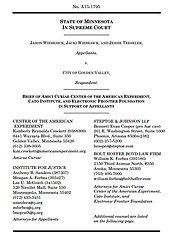Learn more about Cato’s Amicus Briefs Program.
In Kyllo v. United States, the late Justice Antonin Scalia wrote that “The Fourth Amendment’s protection of the home has never been tied to the measurement of the quality or quantity of information obtained.” “In the home,” Scalia wrote, “all details are intimate details, because the entire area is held safe from prying government eyes.” Indeed, our homes are our castles and we’re afforded certain protections and immunities—including the right to exclude unwanted visitors—that apply whether we rent or own. Unfortunately, the U.S. Supreme Court has not always been consistent in protecting the privacy rights of individuals and has construed the Fourth and Fourteenth Amendments as not prohibiting general administrative searches of rental properties. In our system of federalism, however, states have the power to provide more protection for individuals, and that is exactly what we are asking the Minnesota Supreme Court to do in Wiebesick v. Golden Valley. In recent years, general administrative searches of rental properties have increasingly been adopted by local authorities with little protection for privacy interests. These inspections reach the whole of the buildings and all of the activity that occurs within, opening up every aspect of people’s lives to the government—political and religious affiliations, intimate relationships, and even all those Justin Bieber posters and Fifty Shades of Gray books you hide when people come over. Golden Valley, MN, has adopted such a program, whereby landlords and tenants must routinely open their doors to government agents. These searches take place even if both the landlord and tenant believe it not to be necessary. The owner of the property even has to pay a fee for the unwanted search to receive a rental license! The city sometimes makes initial requests for consent, but these are a mere courtesy because the city proceeds with an administrative warrant in the event of a refusal, even without a showing of probable cause to believe there’s a housing code violation or another problem. A group of landlords and tenants have thus challenged the inspection program by invoking Article I, Section 10 of the Minnesota Constitution—which contains language similar to the federal Fourth Amendment—arguing that several alternatives are available to meet what legitimate interests local governments have in making rental properties safe. In Minnesota, this practice is not a new phenomenon. Indeed, the Cato Institute and other Amici sought fought against these same unconstitutional practices four years ago in McCaughtry v. City of Red Wing. Despite our best efforts, the Minnesota Supreme Court did not protect the privacy rights of its citizens in that case. Undeterred, Cato has joined the Institute for Justice, League of Minnesota Cities, American Civil Liberties Union of Minnesota, HOME Line, and the Minnesota Free Market Institute at the Center of the American Experiment, in filing an amicus brief to again urge the Minnesota Supreme Court to confirm that no Minnesotan should be subjected to an intrusive invasion of privacy when there has been no showing of some cognizable public health or safety issue within the home subject to inspection. The Minnesota Supreme Court should be the first state to decide that its state constitution provides greater protections against warrantless home inspections than the Fourth Amendment. No other state judiciary has substantively ruled on constitutional protections against administrative searches in residential contexts, so this case presents an opportunity to set a benchmark for liberty.
